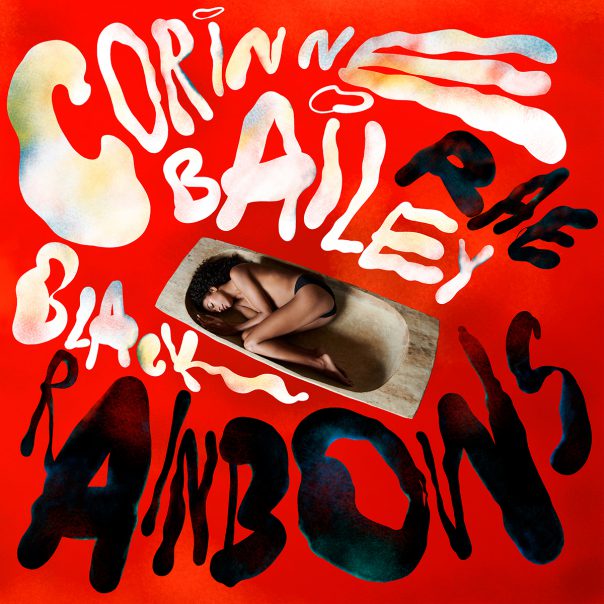ALBUM REVIEW: Corinne Bailey Rae bold and outspoken on ‘Black Rainbows’

Corinne Bailey Rae, “Black Rainbows.”
Corinne Bailey Rae hasn’t graced us with an album since 2016’s The Heart Speaks in Whispers. However, her new record is well worth the wait; Black Rainbows is a nothing short of a jaw-dropping revelation.
Black Rainbows
Corinne Bailey Rae
Thirty Tigers, Sept. 15
9/10
Get the album on Amazon Music.
She’s an established, respected artist, although she perhaps has better name recognition in the U.K. (her home) than she does here. She’s best known here for the poppy, sunny “Put Your Records On,” from her 2006 self-titled debut. Knowing that song, or really, any of her prior work, will not prepare someone for the entrancing, consuming experience of listening to her fourth album, Black Rainbows.
Recorded at Stony Island Arts Bank in Chicago, Black Rainbows reflects the time Rae spent there, absorbing the art collected by Theaster Gates. Housed in a former bank, Stony Island is home to a wide-ranging art collection as well as the archives of Ebony and Jet magazines, and Frankie Knuckles’ vinyl collection. She’s said that she found herself inspired and changed by what she found.
Corinne Bailey Rae seems determined to upend expectations about her sound on this record. She hops through genres and styles with gleeful abandon. “A Spell, A Prayer,” begins the album with a slow, pulsing bass line that’s almost Badalamenti-esque. It then bursts into a bloom of heavily distorted electric guitar. The song undulates between Radiohead-like states of buzzy chaos and soulful multitracked vocals. It’s experimental and fresh and not what most would expect to hear from her.
“Erasure” finds Bailey Rae lamenting the erasure of Black childhood in distorted, snarling vocals over dirty guitar that conjures up PJ Harvey in her Dry era. Invoking the memory of children like Tamir Rice, as well as postcards in the Stony Island collection that depicted Black children running from alligators, the song vibrates with righteous anger.
While Bailey Rae fronted a riot grrl band in her teens, it’s not widely known, nor was the influence apparent in her previous work. However, “New York Transit Queen,” with its joyous handclaps, grungy guitar and chanted vocals, would slot in neatly with the energy of those ’90s bands. The song was inspired by an archival photo of the 1954 coronation of fashion icon Audrey Smaltz, in the Stony Island collection.
“Earthlings” finds Bailey Rae’s voice processed to sound alien over bleeping synth grooves as she says, “Don’t you know, Earthlings?/ You can start again/ Simply press refresh/ To begin again.” A face-melting overdriven guitar is incongruous with the sweetness of her voice as she invites us all to reset and create a utopia. Birds chirping merrily bring the alien interlude to an end.
Bailey Rae’s sweet, high voice with just a bit of rasp is still a powerful instrument, but it’s not the focal point of the album. Rather, for the most part, the sound of Black Rainbows is centered on the band, including her husband and multi-instrumentalist Steve Brown. Brown, who’s also a co-producer and co-writer, is truly a utility player here, credited with playing not only drums, bass and guitar on various tracks, but also ocarina, wind chimes and knifonium (a 26-tube monophonic synthesizer).
On the last few songs, the mood is calmer, and Bailey Rae leans back into the power of her voice. “Peach Velvet Sky” pares it back to just her voice sailing over piano. “Peach Velvet Sky” was inspired by “Life of a Slave Girl,” the autobiography of Harriet Jacobs, a young enslaved woman who hid in a crawl space for seven years and saw the sunset only through a small loophole.
The album ends on “Before the Throne of the Invisible God,” on which Bailey Rae’s voice stretches and holds notes in a reverent way reminiscent of Jeff Buckley, even as flute and saxophone float in and out beneath. Corinne Bailey Rae successfully brings listeners through many styles and emotions on Black Rainbows. At the end, she brings the plane down gently, making us glad we were along for the ride.
Follow Rachel Alm at Twitter.com/thouzenfold and Instagram.com/thousandfold.
